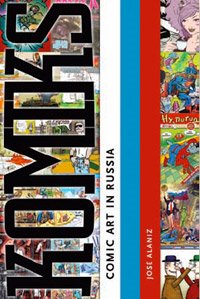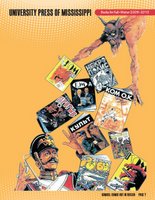New Book from UPM - Komiks: Comic Art in Russia
As many followers of this blog already know, the University Press of Mississippi has been "the comics scholar's best friend" for nearly two decades, beginning with their publication of M. Thomas Inge's Comics as Culture in 1990. February 2010 will see UPM release José Alaniz' Komiks: Comic Art in Russia, which is featured on the front cover of their Fall-Winter 2009-2010 Catalog (view online or download the PDF). I'm happy and honored to have know José for many years, and I've heard bits and pieces of this book at various conferences, so I know that Komiks will be not only authoritative but interesting as all get-out. Congtratulations on making the cover, José!
Komiks have often borne the brunt of ideological change—thriving in summers of relative freedom, freezing in hard winters of official disdain. This volume covers the art form's origins in religious icon-making and book illustration, and later the immensely popular lubok or woodblock print. Alaniz reveals comics' vilification and marginalization under the Communists, the art form's economic struggles, and its eventual internet "migration" in the post-Soviet era. This book shows that Russian comics, as with the people who made them, never had a "normal life."
José Alaniz is associate professor of Slavic languages and literatures and comparative literature at the University of Washington, Seattle. His work has appeared in the International Journal of Comic Art, Comics Journal, Studies in Russian and Soviet Cinema, Ulbandus, and other periodicals.


Komiks: Comic Art in Russia
José Alaniz
The first study to trace the evolution of Russian comics
from Soviet bête noire to post-Perestroika art form
from Soviet bête noire to post-Perestroika art form
José Alaniz explores the problematic publication history of komiks -- an art form much-maligned as "bourgeois" mass diversion before, during, and after the collapse of the USSR -- with an emphasis on the last twenty years. Using archival research, interviews with major artists and publishers, and close readings of several works, Komiks: Comic Art in Russia provides heretofore unavailable access to the country’s rich—but unknown—comics heritage. The study examines the dizzying experimental comics of the late Czarist and early revolutionary era, caricature from the satirical journal Krokodil, and the postwar series Petia Ryzhik (the "Russian Tintin"). Detailed case studies include the Perestroika-era KOM studio, the first devoted to comics in the Soviet Union; post-Soviet comics in contemporary art; autobiography and the work of Nikolai Maslov; and women's comics by such artists as Lena Uzhinova, Namida, and Re-I. Alaniz examines such issues as anti-Americanism, censorship, the rise of consumerism, globalization (e.g., in Russian manga), the impact of the internet, and the hard-won establishment of a comics subculture in Russia.
Komiks have often borne the brunt of ideological change—thriving in summers of relative freedom, freezing in hard winters of official disdain. This volume covers the art form's origins in religious icon-making and book illustration, and later the immensely popular lubok or woodblock print. Alaniz reveals comics' vilification and marginalization under the Communists, the art form's economic struggles, and its eventual internet "migration" in the post-Soviet era. This book shows that Russian comics, as with the people who made them, never had a "normal life."
José Alaniz is associate professor of Slavic languages and literatures and comparative literature at the University of Washington, Seattle. His work has appeared in the International Journal of Comic Art, Comics Journal, Studies in Russian and Soviet Cinema, Ulbandus, and other periodicals.

FEBRUARY, 288 pages (approx.), 6 x 9 inches
21 color and 69 b&w illustrations, bibliography, index
Cloth $38.00, 978-1-60473-366-2
21 color and 69 b&w illustrations, bibliography, index
Cloth $38.00, 978-1-60473-366-2
Image credits: Top: UPM's website. Bottom: UPM's Fall-Winter 2009-2010 Catalog.
Labels: academic, Alaniz, Inge, komiks, Russia, UP Mississippi


